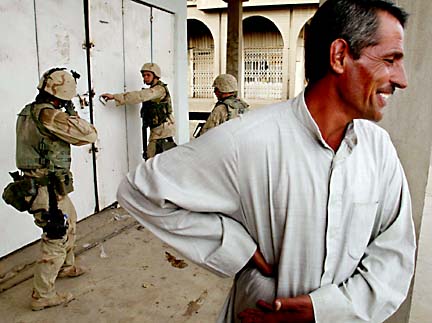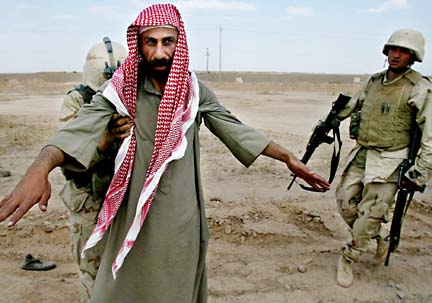
[ WAR IN IRAQ ]
KEVIN FRAYER / ASSOCIATED PRESS
A shopkeeper stood in front of his store this morning as U. S. marines searched for resistance in Tikrit.
Tikrit falls Saddam Hussein's hometown of Tikrit fell with unexpectedly light resistance on Monday, the last Iraqi city to succumb to overpowering U.S.-led ground and air forces. A senior Pentagon general said "major combat engagements" are likely over in the 26-day war.
U.S.-led forces take Saddam Hussein's
hometown with little resistanceBy David Espo
Associated PressAs fighting wound down, Pentagon officials disclosed plans to pull two aircraft carriers from the Persian Gulf. At the same time, Iraqi power brokers looked ahead to discussions on a postwar government at a U.S.-arranged meeting set for Tuesday.
"I would anticipate that the major combat engagements are over," Maj. Gen. Stanley McChrystal told reporters at the Pentagon. Tikrit fell with no sign of the ferocious last stand by Saddam loyalists that some military planners had feared.
Secretary of State Colin Powell hinted at economic or diplomatic sanctions against Syria, saying the government is developing a weapons of mass destruction program and helping Iraqis flee the dying regime. Syrian officials denied the charges.
Looting eased in Baghdad after days of plundering at government buildings, hospitals and an antiquities museum, and group of religious and civil opposition leaders met in the capital to plan efforts at renewing power, water, security and other vital services.
American forces found prodigious amounts of Iraqi weaponry, French-made missiles and Russian anti-tank rocket launchers among them. And Army troops discovered thousands of microfilm cartridges and hundreds of paper files inside a Baath Party enclave as the dead regime began yielding its secrets.
In Tikrit, about 90 miles north of Baghdad, "There was less resistance than we anticipated," Brig. Gen. Vincent Brooks told reporters, as American ground troops moved into the city after days of punishing air strikes.
ASSOCIATED PRESS
An Iraqi man was searched by U. S. Marines today near an area where they were looking for resistance in Tikrit, northern Iraq.
American forces captured a key Tigris River bridge in the heart of town and seized the presidential palace without a fight as they rolled past abandoned Iraqi military equipment.
They set up checkpoints to keep prominent regime figures from leaving, and a line of armored vehicles was parked in front of a bazaar inside the city.
"We have had engagements, and we have defeated the enemy in every one of those engagements," said Capt. Frank Thorp, a spokesman at U.S. Central Command.
The operation inside Tikrit, Brooks added, "is really the only significant combat action that occurred within the last 24 hours." McChrystal told reporters, "I think we will move into a phase where it (combat) is smaller, albeit sharp fights."
With Saddam and his two sons dead or in hiding, his regime gone and his armed forces routed, U.S. commanders took steps to reduce American firepower in the war zone.
A U.S. defense official said two of five aircraft carrier battlegroups in the region would soon be departing, the USS Kitty Hawk returning to its base in Japan and the USS Constellation to San Diego. Each carrier has about 80 warplanes, including F/A-18 and F-14 strike aircraft as well as surveillance and other support craft.
The Air Force already has sent four B-2 stealth bombers home.
With fighting on the wane, troops continued their search for remaining POWs as well as evidence of weapons of mass destruction.
A team of experts from the CIA and Defense Intelligence Agency has arrived in the Persian Gulf region to search for clues to the whereabouts of Capt. Scott Speicher, a Navy pilot shot down during the 1991 Gulf War, officials said.
While American and British teams systematically searched for banned weapons, Maj. Trey Cate, a spokesman for the 101st Airborne Division, said tests were planned on 11 shipping containers found buried near Karbala with lab equipment inside.
One U.S. official, speaking on condition of anonymity, said an Iraqi nuclear scientist, Jaffar al- Jaffer, had surrendered to authorities in an unnamed Middle Eastern country in recent days and was being interviewed by Americans.
On Saturday, Saddam's top science adviser, Lt. Gen. Amer al-Saadi surrendered to U.S. forces.
In Washington, Powell became the latest senior administration official to accuse Syria of harboring former members of Iraq's regime and of maintaining a chemical weapons program.
"Of course, we will examine possible measures of a diplomatic, economic or other nature as we move forward," Powell told reporters.
"There is no cooperation. We have no chemical weapons," said Fayssal Mekdad, Syria's deputy ambassador to the United Nations.
In London, British Prime Minister Tony Blair said Syrian President Basher Assad had personally assured him that his government "would interdict anybody" crossing the border from Iraq. "And I believe they are doing that," Blair told the House of Commons.
More and more, efforts were turning to building a postwar Iraq. Officials made preparations for a meeting Tuesday in the southern city of Ur, which is listed as the birthplace of Abraham as well as the capital of Mesopotamia in antiquity.
There, Iraqis from inside and outside the country will begin discussions on the shape of a future government.
At the Pentagon, Defense Secretary Donald H. Rumsfeld said "it's not possible to know how long" a process of stabilization will take inside Iraq.
Government offices and most stores remained closed in the capital, but many buses were running, packed with passengers. The first joint patrols moved through Baghdad during the day, with Marines and Iraqis working together.
Police Lt. Col. Haitham al-Ani said American troops and Iraqis would patrol in separate cars and that the Iraqis would be unarmed, at least for now.
At the same time, a group of local leaders met in Baghdad to discuss security and plans to restore water and electricity to a city that has been without power for more than a week. One Shiite Muslim cleric, Ayad al-Musawi, told the meeting there should be "no Sunni, no Shiite, just one Iraqi nation."
He added, "God willing, we will be one hand, one voice and not betray each other."
American forces in Baghdad and elsewhere reported finding large amounts of Iraqi weapons. At a palm grove in one neighborhood, troops dug a pit 10 feet deep, five feet wide and 25 feet long, then filled it with thousands of rounds of ammunition, grenades and other weaponry, apparently in preparation for detonation.
Also in Baghdad, Marines found about 80 Frog-7 missiles, Russian-made anti-tank rocket launchers and French-made Roland missiles, according to Capt. Daniel Schmitt.
Hawaii military links and information

